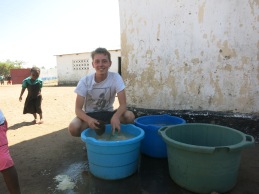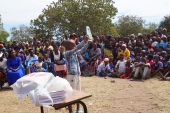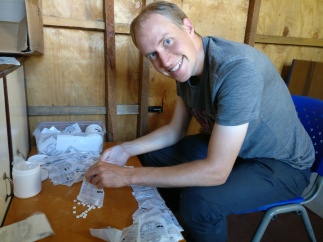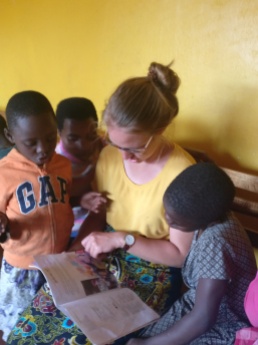Almost halfway through our year long trip we headed to Malawi to spend 5 weeks as volunteers in the small village of Lifuwu just at the shore of Lake Malawi. We work with help2kids, a Swiss NGO, and in just 5 weeks we have experienced quite a lot! So prepare for a very long blog post 😉
Life in Lifuwu
In Lifuwu we live at the Friendly Gecko, which is a guesthouse managed by help2kids. It mainly houses the volunteers, the program manager, Garrett, and the volunteer coordinator, Victoria — and during the daytime all the local staff is around as well. Anette, our cook, with her lovely baby Theo, Leke, Anette’s helper, and the guards making sure that everything is in order including the garden 🙂
The transition from being on the move to living in a small village took some time.
First and foremost, we had to get used to being “famous”. In a village like Lifuwu everybody wants to know who you are, and everybody knows where you live. Whenever we walk outside we are greeted by children happily yelling “azungu” (meaning “white persons”), and they come running to hold our hands and proudly walk with us through town. The adults usually use the appropriate greetings for the time of the day in Chichewa, and love to test us to see if we have learned the full exchange of questions and answers. For the morning one it goes like:
- Mwadzuka bwanji? (How have you woken up?)
- Ndadzuka bwino, kaya inu? (I have woken fine, and you?)
- Ndadzuka bwino, zikomo! (I have woken fine, thank you).
To be able to speak a little bit with all the lovely people we started learning Chichewa. Our guard Isaac from the guesthouse was our teacher, and every week we got a bunch of new words and sentences to learn. As always Ulrik went all in and created loads of online flashcards to help our learning. So if you want to learn Chichewa just go ahead 😄
Next step was to get used to the very direct way the Malawian people approach you. Often children along with adults will yell from hundreds of meters away “you” — or the Chichewa equivalent “iwe” — just to make you look up, and they will give you a wave, or a thumbs up, or ask about your name.
By now we have learned that Ulrik is a very difficult name to pronounce if you do not happen to speak Danish or German. Therefore, Ulrik has ended up with the lovely nickname “Good Luck” as it apparently sounds the same for the Malawians 😛
Another thing that we had to learn is that in Lifuwu you can only get the most basic things. The rest we have to get via one of the volunteers on the weekly shopping trip to Salima, or see if we are lucky and a trader comes by Lifuwu at the Tuesday market to sell it. In general we have become way more creative about vegetarian dishes that can be made out of onion, green beans, green pepper, carrots, aubergine, and tomatoes 😜 Meat is hard to come by, and often you do not want to buy it when you see how it is handled and/or realise you will have to act butcher first 😉
The first days it was all quite overwhelming, but we saw no better way to absorb it all than just start working at the projects and get used to the routines.
The projects
Our time are been split between working with the local kids and helping out at the local health clinic. The main part of our mornings are spent at one of the two nursery schools in the village: Tiyanjane Nursery School and Chisomo Nursery School.
Nursery Schools
The two schools turns out to be very different, as even a small village like Lifuwu has rich people — at least compared to the general population.
Tiyanjane Nursery School is sponsored by help2kids, and the children can go there for free — they even get a portion of phala (a kind of maize porridge) every day before they go home. The school has three classes, and more than 150 students between the age of 2 and 6.
Our main tasks with classes that size with only one teacher is crowd control — we are getting good at the phrases in Chichewa that help make the kids sit down and not fight 😛. Also, we help doing the dishes after the porridge, as it turns out that there are not enough spoons and plates for all the kids, so the dishes has to be done several times during the serving to make sure that all the kids get their daily meal of phala.
Chisomo is a little smaller with about 80 students split in two classes, and the parents pay for the children to go there. Here, we mainly play with the children during their break — and help in the classroom during classes. It is all a little chaotic, as many of the children just want to hang around you, touch your hair and skin, and ask you your name about one million times. And the youngest ones have a really hard time understanding that even though we can say a few sentences in Chichewa we do not understand them when they start talking to us 😛. When it all becomes a little too much, the best you can hope for is a monkey making its way down from the mountain to the area near the school, because then most of the toddlers will run off to chase the monkey, and you get a few minutes break 😉.
Everything with the nursery schools are kind of chaotic, but you cannot help noticing how capable these young toddlers are. One day Gitte encountered two girls age 3 or 4, who had tampered a ball pen and were now painting their nails with a tiny wooden stick they could dip into the ink. Or when 3 year olds come with the empty plate and spoon and nicely wash it to hand it over to the next kid still waiting to get her meal.
In our last week we joined the closing ceremony for this school year at Chisomo Nursery School. It was a big ceremony, where all the children (age 2-6) were called up in front according to their test scores to receive gifts from the teachers and specially from their parents — with special gifts for the best students. The day after we went for the closing ceremony for one of the primary schools to see a similar procedure for about 700 students. The schooling system in Malawi is very different from what we know from Denmark! And Malawian mothers are incredibly proud of their children’s school results 😍
Health Clinic
The other mornings we support the local health clinic. The clinic serves about 18.000 people living in Lifuwu and surrounding villages. It has a few handfuls of employees, and hosts a pharmacy, some version of a health professional taking on the role as some kind of general practitioner, a lab, a maternity clinic, an HIV clinic, and an outreach programme.
Outreach
The outreach programme goes out to 8 surrounding villages, each visited once a month. Here, children between the age of 0 and 5 come with their mothers to be weighed, measured, and get free vaccinations — even the mothers can be vaccinated. Help2kids provide the vehicle and driver to get to these rural villages. We volunteers take care of the measuring and weighing, as the health professionals are more than busy enough administering the vaccinations. This way we have become quite experienced “measurers” — as we have measured about 800 babies and toddlers 😛.
Outreach is quite nice — we get to see the surrounding villages, in the car we often engage a lot with the health professionals, and on site we get much closer to Malawian everyday life. Most of the babies seems healthy (they are within the WHO growth expectation), but every now and then you do encounter a kid who are way too small, malnourished, or just sick. But now and then you will also meet amazing stories like when Gitte met a mom with triplets, now 6 months old. It seems too good to be true that triplets can survive when born in a small rural village in Africa!
Helping at the clinic
When we are not on outreach we help the pharmacy by packing their medicine, as they receive it in big bulks — and only hand it out as small portions. What seems to be treated most here is infections causing diarrhoea and general pain treated with aspirin. And then, of course, there are loads of malaria tests around. And on Wednesdays we help at the HIV clinic by weighing the patients as well as finding their patient master card in the paper-based patient register so the health professionals can take care of the adjustment of medication, etc. It is quite interesting to work manually with systems that Ulrik back home makes sure computers can handle 😛.
Beach Games
The afternoons are much more free. A few days a week we go to the beach and play games or bring materials for creative activities and spend the afternoon in company with the local kids. It is surprisingly popular to hang out with the “azungu” at the beach! One day we even had a bunch of 20 year old boys making yarn bracelets 😀. Other popular activities are flying kites, playing with frisbees, and building sand castles.
Grass Roots Soccer
Two days a week the local youth group “Grass Roots Soccer” meets at the soccer field behind Lifuwu Primary School. It sounds like a soccer club, but in fact it is much closer to the scout work we are used to back home. It is a bunch of kids who loves to play and to learn new games. Twice a month the volunteers come by and do an educational session. During our stay we had the honour of educating the young boys and girls on dental hygiene and the infectious disease bilharzia that you can get from the water in Lake Malawi. The rest of the time we just show up with new games and have a great time — we have showed off quite a few well-known games from FDF 😄.
Lifuwu Community Library
Instead of playing we sometimes go to the small Community Library sponsored by help2kids and help the eager learners spell their way through books in English, or point out animals for the younger kids. Or we help teaching English in the afternoon English class.
Maternity Clinic
Last, Gitte has been to the maternity clinic a few times. This is an initiative where pregnant women can go to the health clinic when the birth comes close and stay there for free to make sure they will be able to reach the clinic when they start giving birth — and that they get food during the last part of their pregnancy. As they usually do not know their due date they sometimes stay there for weeks waiting for their baby to be born — so the female volunteers go there and hang out with them. Painting nails, making bracelets, or playing UNO or the local game bawo. Usually, none of them speaks English, and we are never really sure how many is actually pregnant, and who are just relatives hanging out, but we have great fun just hanging out and practicing the few sentences Gitte knows in Chichewa.
Our weekends
On the weekends we take a deserved break from playing and being “famous”. We went to Billy’s, and we have hiked the local Lifuwu Hill twice as the first time gave us thirst for doing it at sunrise also. Also, we spend a weekend in the tourist spot of Nhakata Bay, where we could finally swim in our swimsuits instead of clothes. The rest of the time we just relax, play games with the other volunteers, or walk to nearby Senga Bay for souvenir shopping.
But as so many other great experiences it all comes to an end — and this weekend we left Malawi to continue our adventures. Thank you very much to Victoria and Garrett, our volunteer friends Nadja, Ramon, Lisa, Taylor, Micha, Jasmin, and Friederike, to Anette, Leke, Isaac, and the other lovely guards — and a huge thank you to all the great people in Lifuwu, who has put so many new perspectives on our lives. We hope we also gave a bit 🙂



















































One Reply to “”